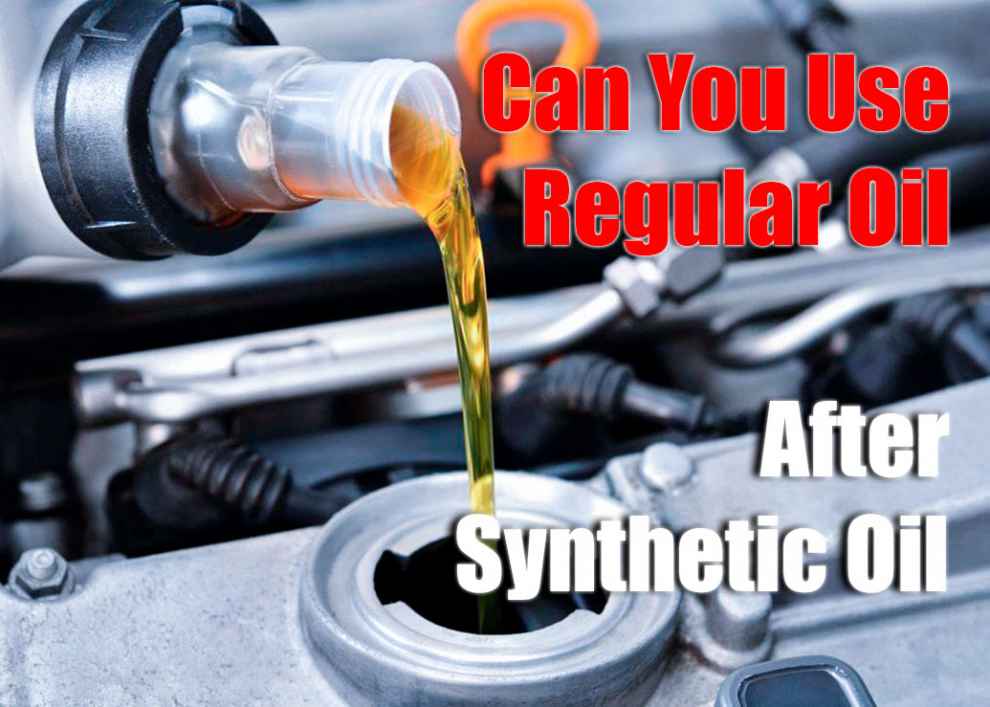A lot of people ask if they can use regular oil after synthetic oil in their vehicle. Synthetic Oil is designed to have superior performance to Regular Oil and it should only be used once Synthetic Oil has been added. The answer isn’t as simple as “yes” or “no,” but the best bet is for you to follow the manufacturer’s instructions on your car’s manual.
What is the difference between synthetic and regular oil?
What Is Synthetic Oil?

What Is Regular Oil?
Regular Oil, which is sometimes called conventional oil, does not contain any synthetic ingredients; instead, they’re made up off petroleum-based compounds like crude oil and natural gas liquids (NGLs). Regular Oils work well when it comes to providing lubrication but don’t withstand harsh conditions, as well as Synthetics, do over the long term.
How do you know when to switch from synthetic to regular oil?
It’s recommended to switch from Synthetic Oil back down to Regular Oil when you notice a change in your car’s performance. You should also follow the manufacturer’s instructions on your manual for how long until you need more Synthetic Oil. If it states that Synthetic is needed every 50,000 miles or sooner than that, then be sure to have synthetic oil ready before the time comes again.
Pros and cons of using each type of oil
Pros of Synthetic Oil
- Outstanding Wear Protection
- Maximum Heat Protection
- Stable Viscosity
- Outstanding Performance
- Keeps the Engine Cleaner
- Optimized Fuel Consumption
- Better Turbocharger Protection
Cons of Synthetic Oil
More expensive than Regular Oils ($24.99) and Synthetics need to be changed more often (every 15,000 miles or 12 months). Synthetics also require a special filter that is not readily available at auto parts stores.
Pros of Regular Oil
- Inexpensive. Costs less than Synthetics ($14.99) and Regular Oil needs to be changed less often (every 25,000 miles or 18 months).
- Ideal for New Cars
- Ideal for Old Vehicles
- Readily Available
Cons of Regular Oil
Lacks the superior performance that Synthetic oils have when it comes to heat protection, wear resistance, stability in viscosity and more. They also don’t clean your engine as effectively over time since they’re made from crude oil and natural gas liquids as Synthetics do.
Can You Use Regular Oil after Synthetic Oil?
What Happens If You Use Regular Oil Instead of Synthetic? The best bet is for you to follow the manufacturer’s instructions on your car’s manual. It’ll state when Synthetic needs to be changed back down, how often Synthetic should change and more specs about the engine which will make it easier for you so there are no unnecessary problems that arise from using Regular instead of Synthetic.
So while it might seem tempting, before switching oils with different purposes than those intended by your manufacturer, do your research and follow the guidelines. Synthetic is not designed for Regular use, as synthetic are engineered to withstand harsh conditions like heat, wear, or chemical breakdown that would happen more often with regular oil which can lead to engine failure over time.
Note: be sure you keep an eye on your car’s performance because it will let you know when it needs a change in oils from Synthetic back down to Regular.
Final Words
Synthetic oils are engineered to have superior performance features than Regular oil and typically last longer. They also help keep your engine cleaner over time, reduce chances of breakdown from chemicals or combustion byproducts that lead to deposits on the parts inside your car’s internal workings, and more.
Make sure you know when the manufacturer recommends changing out Synthetics back down to Regular Oil because it’ll change based on usage conditions which might not be what you’re looking for if you prefer a less expensive option like Regular Oils instead of Synthetics.


Add Comment